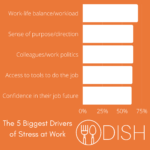
05 May The Biggest Stresses at Work and How to Combat them
Most of us spend around 40% of our waking hours at work and the workplace often comes with a lot of stress. To combat this stress, it’s important to first determine the main causes. According to a LinkedIn survey, the biggest causes of stress in the workplace are as follows:

How to Combat Stress at Work
- Work-life balance/workload
Some stress can be helpful in the workplace; it makes us productive and helps us meet deadlines. If you find yourself almost constantly overwhelmed by your workload, however, something needs to change.
- Try using the Eisenhower matrix – the Eisenhower matrix helps you to prioritise tasks according to importance and urgency. Simple draw the simple graph and arrange your tasks depending on how important and urgent they are. Then complete your most essential tasks with the closest deadlines first.

- Set out a task list – after determining which tasks to focus on, write a task list and check off tasks once completed for serotonin boosts throughout the day. Note down estimates of the length of time each task should take; if a task begins to overrun and dominate your time, move on to another task.
- Ask your manager for help – if you’ve prioritised your tasks and managed your time and you’re still overwhelmed by your workload, speak to your manager to discuss a solution. If this doesn’t resolve the issue, it may be time to reach out to your recruiter and look for opportunities at other organisations (see our blog post “6 Signs it’s Time to Change Jobs: Do Any Apply to You?”).
- Don’t forget to use your breaks – when the pressure is on, it can be tempting to use every minute available in an attempt to shorten your to-do list but working without breaks can have an adverse effect on your productivity as well as add to your stress levels.
2. Sense of purpose/direction
The pressure of having the perfect job and an ambitious career plan is plaguing more and more young professionals. It’s important to avoid comparing yourself to others. Making small steps every day toward your goals will help to ease stress related to purpose and direction.
- Don’t compare yourself to social media – remember social media presents the highlights of people’s lives and can easily distort our views of what is “normal” and what success looks like. Try not to compare your career journey to what you see on social media.
- Reflect – It might be helpful to reflect regularly on what you like and dislike about your current job and what you hope for in the future. Is there something you can do to move yourself a little closer to where you want to be in your career like a training course or increased responsibilities?
- Try new things – take every opportunity to try new skills and roles within your job or through voluntary work and training. You may stumble upon a passion you would like to pursue in the future.
3. Colleagues/work politics
Every workplace has a different culture and dynamic; sometimes it just clicks and everybody gets along…sometimes it doesn’t. Workplace politics can be a big cause of stress but there are things you can do to avoid stressful relationships with colleagues.
- Avoid gossip – gossip is often used to bond with others or just alleviate boredom but it can often lead to strained relationships and stressful disagreements. Overall, it’s better to not get involved.
- Discuss your concerns – if you are drawn into a disagreement with a colleague, try to resolve it informally with the support of your manager or another colleague if you feel this would help.
- Get help – If the situation cannot be resolved informally, raise it with your manager, HR department or union representative. Visit the Mind UK website for advice on dealing with bullying in the workplace.
4. Access to tools to do the job
If you feel as though your access to tools is inhibiting your ability to carry out your role, this is something to raise with your manager.
5. Confidence in their job future
As the world continues to change and technology develops, it’s essential to keep up with the latest developments in your field and take part in training to constantly improve your skillset.

